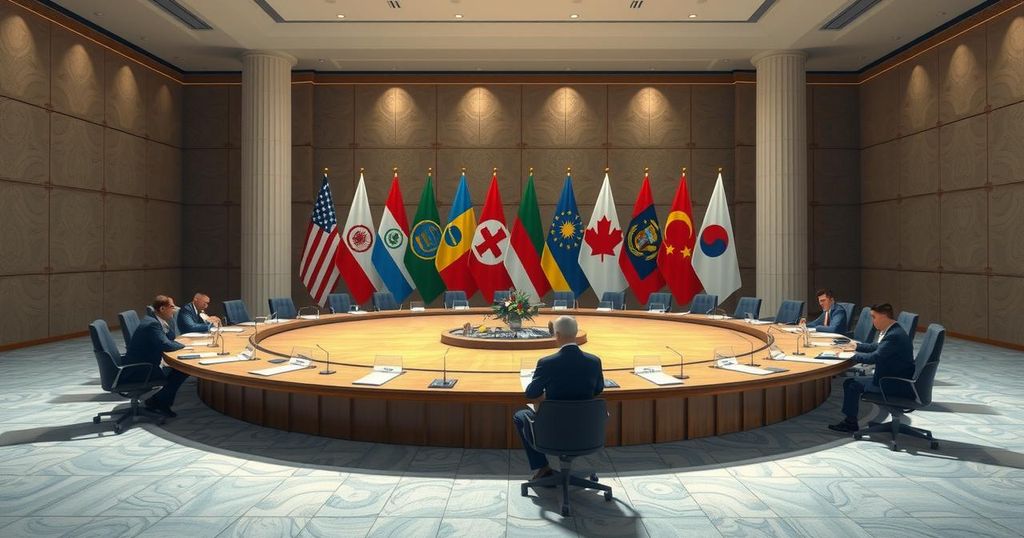Russia’s Diplomatic Insights and Perspectives on Global Conflicts

In an interview, Dmitry Polyanskiy criticized the Biden administration for worsening the Ukraine conflict, contrasting it with the Trump administration’s approach. He emphasized the importance of Saudi Arabia’s emerging diplomatic role and highlighted the need for unified Arab efforts regarding the Palestinian issue. Polyanskiy also touched on Russia’s support for Sudan and advocated for a peaceful transition in Syria.
In a recent interview on the Arab News program “Frankly Speaking,” Dmitry Polyanskiy, Deputy Permanent Representative of Russia to the UN, criticized the Biden administration’s role in the Ukraine conflict, asserting it exacerbated the crisis. He emphasized that the previous US administration contributed significantly to escalating tensions with Russia, leading to the current war. Polyanskiy claimed, “The previous (American) administration was unfortunately part of the problem, not part of the solution.”
He suggested that a change in diplomatic approach could have mitigated the conflict much earlier. According to Polyanskiy, the Biden administration is perceived as perpetuating the conflict compared to the Trump administration, which he described as adopting a more realistic viewpoint. He stated, “The Trump administration views it absolutely differently, and this is the right approach.”
Recent talks in Saudi Arabia sought to address the conflict, focusing on a potential ceasefire in the Black Sea region. Polyanskiy acknowledged Saudi Arabia’s emerging role as a diplomatic center, contrasting it with Geneva’s compromised status due to Switzerland’s alleged lack of neutrality. He remarked, “The world is changing, and new centers of diplomatic activity are emerging.”
Regarding the Gaza crisis, Polyanskiy highlighted Russia’s long-standing support for Palestinian rights and the necessity of a two-state solution. He recognized the limitations of Russian influence on Israel compared to the US, indicating that US involvement is crucial for any meaningful progress in the Middle East. “The US role here is indispensable to put Israel on a more reasonable path,” he said.
While criticising the US’s previous normalization efforts between Arab states and Israel, he underscored the importance of addressing Palestinian concerns. He expressed optimism that unified Arab demands could elevate the Palestinian issue in future discussions. He affirmed, “The louder they speak, the more chances there are to see that these very rightful and fair demands are heeded.”
When discussing the crisis in Sudan, Polyanskiy conveyed Russia’s support for the Sudanese government amidst ongoing conflict, asserting gains in the battlefield against opposing forces. He stated, “We support the Sudanese authorities,” reflecting Russia’s preference for stability through local governance.
In relation to Syria, Polyanskiy reaffirmed Russia’s commitment to supporting a peaceful transition, emphasizing the need for inclusive governance that combats terrorism. He indicated Russia’s desire for sustained friendship with Syria, despite the complexities of Assad’s recent governmental challenges. He said, “We want to see inclusive Syrian authorities that represent all Syrians.”
Amidst the backdrop of various global crises, Polyanskiy’s comments highlight Russia’s stance on its diplomatic maneuvering and the broader geopolitical implications influencing conflicts in Ukraine, the Middle East, and beyond.
Dmitry Polyanskiy’s interview provided critical insights into Russia’s perspective on the Ukraine conflict and other regional issues. He criticized the Biden administration’s approach, contrasting it with the Trump era and underscoring Saudi Arabia’s emerging diplomatic role. Polyanskiy also emphasized the need for unified Arab efforts regarding the Palestinian issue and reaffirmed Russia’s commitment to supporting both Sudanese authorities and a peaceful transition in Syria. The dialogue highlights Russia’s strategic diplomatic positioning amidst ongoing global conflicts.
Original Source: www.arabnews.jp







